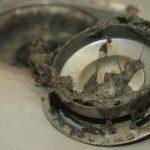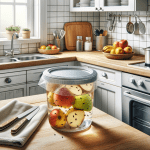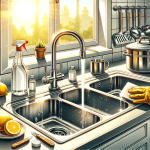Noticing foul odours emanating from your kitchen drain can be truly unpleasant. But what causes these undesirable emanations? As an experienced plumber, I can tell you there’s usually a valid explanation behind the stench. So, without further ado, let’s delve into the top 10 culprits of kitchen drain odours and address all these issues in detail.
Contents
- 1. Rotting Food Debris
- 2. Stagnant Drain Water
- 3. Old Plumbing System
- 4. Sewer Gas Backup
- 5. Infrequent Use
- 6. Pipe Build-Up
- 7. Faulty Garbage Disposal
- 8. Bacteria in Drain
- 9. Blocked Vent Pipes
- 10. Accumulated Grease
- 11. Drain-Dwelling Mold
- 12. Dead Pests
- 13. Vegetable Peelings
- 14. Coffee Ground Buildup
- 15. Rotten Eggs Smell
- 16. Poorly Sealed Pipes
- 17. Garbage Disposal Clog
- 18. Neglected Food Scraps
- 19. Rotten Fruit Smell
- 20. Deteriorating Pipe Material
- In Conclusion
1. Rotting Food Debris
No prize for guessing, the most common trigger behind smelly drains is rotting food debris. Leftover bits from your dishes can get stuck in the sink or garbage disposal unit, leading to degradation and eventual odour formation. The nasty smell stems from organic material breaking down, not unlike composting. Regular cleaning using a biodegradable cleaning agent or sodium bicarbonate can help keep this odour at bay.
2. Stagnant Drain Water
It’s surprising how much damage stagnant water can do. In your drain system, water usually sits within a trap (plumbing) section, creating a barrier between your kitchen and sewer gases. When water stagnates in this trap due to infrequent use or slow drainage, it becomes a breeding ground for bacteria and mould. These microorganisms produce gases that smell as they grow, thus producing unpleasant sewer gas aromas.
3. Old Plumbing System

If you inhabit an old construction with antique plumbing, the foul smell could be a symptom of an outdated and deteriorating sanitation system. Dated pipes may corrode or warp over time, causing leaks or blockages that stink up your kitchen. Furthermore, old systems may lack modern features like P-traps that prevent sewer gases from wafting back up.
4. Sewer Gas Backup
Sometimes, your piping might be perfect but the problem lies within the larger sanitary sewer infrastructure. If there’s a backflow of sewage or just sewer gas, you can bet it’ll carry an unholy smell. It’s an issue that needs quick environmental engineering intervention, potentially calling for replacement or repair of check valves.
5. Infrequent Use
Your seldom-used kitchen sink might be more prone to stenches. Infrequent use may result in drying up of traps, letting sewer gas waft into your home. Moreover, water sitting idly in pipes can grow stagnant and breed bacteria, as discussed before. Thus, occasional usage is crucial to keep pipes flushed and odour-free.
6. Pipe Build-Up

With plumbing, residues inevitably accumulate over time – things like soap scum, grease, hair strands and even hard water deposits. These build-ups not only block drains but also trap food particles and other debris that rot and often release ghastly odours. Regular drain cleaning with appropriate tools can prevent this issue.
7. Faulty Garbage Disposal
If you have a garbage disposal unit installed and are noticing bad smells, there’s good chance your appliance might be at fault. When food particles get trapped in the disposal’s nooks and crannies, they start rotting and exude unpleasant odours. Routine cleaning and maintenance of your garbage disposal unit are paramount in preventing such issues.
8. Bacteria in Drain
Your kitchen drain offers a dark, moist environment that’s perfect for certain bacterial growths. In particular, sulphur bacteria tend to thrive in such conditions and their metabolic processes produce a classic rotten egg smell. The best counter-strategy includes cleaning your drain regularly to keep bacterial populations under control.
9. Blocked Vent Pipes

Part of the plumbing system includes vent pipes that maintain neutral pressure inside drains and escort sewer gases out through your roof. Blockages in these vents, often from nesting birds or debris, can trap these odorous gases inside, forcing them back out through your drain. A hydraulic engineering professional could help pinpoint and resolve such issues.
10. Accumulated Grease
Last but not least, the infamous grease accumulation in drains could be causing that besmirched kitchen atmosphere. Grease and fat, while liquid during cooking, can solidify and grab onto the sides of your pipes when cooled down. Over time, layers build up and start snagging food particles. Not only does this lead to a clogged drain, but also a horrendous smell as organic matter begins to decay.
11. Drain-Dwelling Mold
Left unchecked, kitchen drains can become a haven for mold growth, a leading cause of lingering odours. The moist and sometimes food-filled environment provides the perfect conditions for different types of fungi to thrive. Each drain type, such as the sanitary sewer or sink drain, poses a unique challenge. Besides causing unpleasant smells, spores from mold may present respiratory hazards, especially to those with allergies or asthma. Regular cleaning using environmental engineering approved products like sodium bicarbonate can help combat such issues.
12. Dead Pests

You might not notice it immediately, but dead pests in your drain can induce a foul smell over time. These unwanted visitors often crawl up through your plumbing system—including traps—and end up stranded in your pipe-work. As they decay, odors permeate through the drain, filling your kitchen with a stench. Regular professional checks are crucial in dealing with this unwelcome problem.
13. Vegetable Peelings
Vegetable peelings can create some of the most annoying odours if not disposed correctly. Tossed haphazardly down drains, these scraps start to decompose slowly releasing an unbearable stink that wafts up through your pipes into your home or appliance environment. Composting peelings instead can mitigate this common kitchen faux pas.
14. Coffee Ground Buildup
Coffee enthusiasts beware! Your morning ritual can have dire consequences on your drain’s health if not managed correctly. Coffee grounds tend to build up in pipes over time, causing odors reminiscent of a stale coffee shop. Moreover, the grounds act like a trap inconveniencing the proper flow of water in your sink drain and creating potential clogs. Dispose-off grounds sensibly to evade this issue.
15. Rotten Eggs Smell
Sewer gas typically has a rotten egg smell, and you could encounter it if your drain or disposal unit isn’t correctly used or maintained. This happens when bacteria residing in your sewer line or trap operate anaerobically—meaning without oxygen—and release hydrogen sulfide gas. Regular cleaning helps manage this nasty offender.
16. Poorly Sealed Pipes
Improperly sealed pipes might be the covert culprits behind those persistent foul smells in your kitchen. Leaks around the seals could allow sewer gases to escape, foisting an unpleasant odor into your living spaces. This also poses a hydraulic engineering challenge and requires immediate attention of an experienced plumber.
17. Garbage Disposal Clog
Your garbage disposal unit is indispensable when it comes to keeping your kitchen clean, but when clogged, it can turn into a smelly nuisance releasing a fierce odor into your space. Regular cleaning and cautious use can effectively control the smells originating from here.
18. Neglected Food Scraps

From rice grains to pieces of salad leftovers; tiny food scraps that wash off the dishes stock up in the drain slowly decomposing and emanating strong smells over time. These forgotten remnants can have quite the adverse effect on sanitation and cleanliness. Clean your sink thoroughly after every meal preparation and use a drain strainer to catch smaller particles.
19. Rotten Fruit Smell
Citrus peels although they smell wonderfully fresh upon initial disposal, eventually decompose, giving off the unpleasant scent of rotting fruit through your pipes. Avoid overusing fruit peels as cleaning agents for your sink or garbage disposal system to dodge this lone wolf of the drain odor family.
20. Deteriorating Pipe Material
Over time, the material making up your pipes can deteriorate, mostly due to age, damage, corrosive cleaning chemicals or damp conditions. While the destruction itself doesn’t necessarily give off a smell, it can create spaces for food particles and waste to get lodged, and as they decay, an unpleasant odor develops.
In Conclusion
Ultimately, regular maintenance and proper disposal of waste can prevent most of these odor issues. Remember that your drains aren’t invincible and require consistent upkeep for longevity and cleanliness. But if your kitchen odors persist despite regular cleaning, it’s time to call Dan’s Plumbing. We’ll tackle any issue head-on!
- How Do I Know When It Is Time to Replace a Cracked Porcelain Sink? - November 14, 2024
- What Should I Do If My Water Meter Is Spinning Unexpectedly Fast? - November 14, 2024
- Can a Plumber Help Me Replace a Leaking Garden Tap? - October 14, 2024
Related posts:
 What Are The Top Causes of Foul Odours From My Drains?
What Are The Top Causes of Foul Odours From My Drains?
 How Do I Prevent Food Scraps From Clogging My Kitchen Drain?
How Do I Prevent Food Scraps From Clogging My Kitchen Drain?
 How Do I Prevent Grease Build-Up in My Kitchen Pipes?
How Do I Prevent Grease Build-Up in My Kitchen Pipes?
 How Do I Minimise Fruit Flies in My Kitchen Sink?
How Do I Minimise Fruit Flies in My Kitchen Sink?
 Can Your Plumbers Help Me Replace a Leaky Kitchen Sink?
Can Your Plumbers Help Me Replace a Leaky Kitchen Sink?
 What Is The Best Way to Clean Kitchen Plumbing Fixtures?
What Is The Best Way to Clean Kitchen Plumbing Fixtures?



